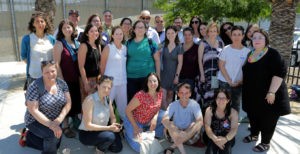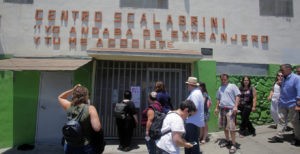María Galvan, the director of the Asunta Migrant Shelter in Tijuana, Mexico, was wringing her hands as she addressed the room full of rabbis. Her voice was quiet and full of emotion. We sat together in a meeting room full of plastic chairs, colchones (sleeping mats) piled in one corner, handmade tortilla chips drying in another. From outside the open window, sounds of life filtered in: Snatches of conversation, passing traffic, the music of children’s voices. The rabbis in the room were uncharacteristically quiet, all of us absorbing the gravity and profundity of the crisis at the US-Mexico border.

Rabbi Arielle Rosenberg of Shir Tikvah (standing at left) was part of a rabbinic delegation convened by T’ruah: The Rabbinic Call for Human Rights. (Photo by Bill Wechter Photography, courtesy T’ruah and HIAS)
I had traveled to San Diego two days earlier, as part of a rabbinic delegation convened by T’ruah: The Rabbinic Call for Human Rights, a Jewish organization based in New York. A group of 25 T’ruah rabbis and cantors crossed the border to try to get to know some of the people behind the headlines that we’ve been reading. We were rabbis from across the country, from across the denominational spectrum. We made the choice to come together to come face-to-face with our broken immigration system and to connect with each other and impacted communities to imagine what we might be able to do.
While visiting migrant shelters in Tijuana, we learned that the situation for migrants in this Mexican border city has shifted dramatically since the 1980s, when the shelters were built. or many decades, migrants crossed the porous border from Tijuana into the U.S. easily, and the shelter system in Tijuana existed to give refuge for a few days to migrants as they prepared for the final leg of their journey. Since 2007, with increased militarization of the border and criminalization of undocumented immigrants, the shelters have been filled primarily with people recently deported from the US.
In both shelters we visited, the majority of occupants had lived in the United States for upwards of 15 years. They had been forced to leave behind their families, homes they were paying mortgages on, jobs they’d been working for decades. They came from Southern Mexico and from Central America, but weren’t ready to leave the borderland city: They wanted to be as close as they possibly could be to their children, to the lives they’d been ripped from. I spoke with one young man outside one of the shelters, who addressed me in unaccented English. “Are you coming from San Diego?” he asked, “I just got deported two days ago from San Diego. I don’t have any family here. I have no idea where to go.”
We looked at each other in silence for a moment. Behind us, 30 men queued in the street, waiting to eat lunch at the shelter. The bus that was waiting to take the
rabbi delegation back to San Diego rumbled before us. He showed me where the handcuffs had cut his wrists. I wished him good luck, that he be reunited with his family, all of whom were in the US. And then I walked onto the bus, feeling helpless in my mobility.

Photo by Bill Wechter Photography, courtesy T’ruah and HIAS
The day before, we’d participated in a powerful march to #AbolishICE. Mijente, a visionary national organization thatrecently published a platform detailing how we might take steps to dismantle the forces of ICE in their community, organized a joyful, culturally diverse, politically incisive march and day of action. The march was led by children, calling for the community of conscience to rise up and free our future. Even as we marched in San Diego, across the country, people are calling for an end to this expanding system of detention and deportation of immigrants, by marching and occupying ICE offices, by interrupting court proceedings where immigrants are tried without due process.
If you’re looking to get involved locally, check out Jewish Community Action and their inspiring Decriminalizing Communities Campaign.
Rabbi Arielle Lekach-Rosenberg is a rabbi at Shir Tikvah in Minneapolis.











